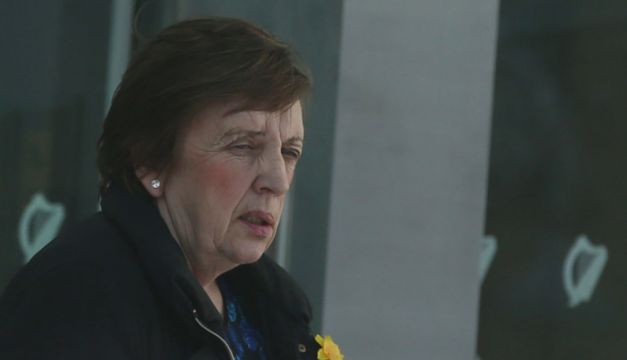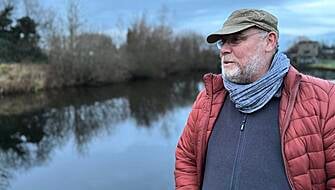A mother whose son tried to murder her by beating her and stabbing her repeatedly with a knife has hit out at failures in the mental health system that she said put her in an "unexpected, dangerous situation" that has left her with lifelong injuries and trauma.
Mary Coughlan made a statement on Friday at a sentencing hearing in the Central Criminal Court for her son Gearoid Coughlan (32), who has been diagnosed with schizophrenia, a disease that posed a risk to her safety of which she was not aware before the assault.
She said she was frustrated that people with paranoid schizophrenia are allowed to live in the community without the care they need, in particular, to ensure they stick to their prescribed medication.
Ms Coughlan said that a lack of communication regarding the level of risk posed by her son's disease left her in an "unexpected, dangerous situation where I endured a horrific assault that almost cost me my life and will continue to impact my life forever. The assault by my son, who I never feared before, resulted in severe injuries, including a traumatic brain injury."
She said her family and Gearoid were "failed by the system" but she still hopes that he can receive care from the best experts to "pave the way for brighter futures for us all." She further told the court that if she could sit with her son in a safe environment, she would "give him a big hug and tell him we all love him. I understand that his illness was the cause of this."
Ms Coughlan said she will not allow the assault by her son to define her life and, since leaving hospital, has returned to singing in her local choir, joined a walking club and enjoys time with her grandchildren.
The court also heard that psychiatrists working with Gearoid have stated that he still lacks insight into his illness and if he stops taking his medication they are concerned that he would develop a psychosis again and be a threat to his family and, in particular, his mother.
Coughlan's lawyers told the court that their client was concerned about the indeterminate sentence he would receive if he were sent to the Central Mental Hospital having been found not guilty by reason of insanity.
His barrister, Alice Fawsitt SC, told the court that Coughlan took the decision not to look for a "special verdict" under the Criminal Law (Insanity) Act and would prefer to serve his sentence in prison rather than in hospital.
Last December, Coughlan, of Ballycoughlan, Inishannon, Co Cork, pleaded guilty to attempting to murder his mother on June 4th, 2021, at her home in Ballycoughlan.
At Friday's hearing, Det Garda Peter Nolan told Tom Creed SC, for the Director of Public Prosecutions, that on June 4th, 2021, Ms Coughlan's daughter Joanne became concerned after her mother texted her to say that Gearoid was at her house, appeared to be "quite down" and was saying: "You're not my mother."
Joanne's husband, a GP, immediately went to Ballycoughlan where he found Ms Coughlan lying face down in a pool of blood on her kitchen floor, grunting and struggling to breathe. He cleared her airways, stemmed the bleeding and called emergency services.
Garda Nolan agreed that an emergency medical consultant said that Ms Coughlan would have died within minutes were it not for the doctor's intervention.
Gardaí found Gearoid at a bus stop about 4km from his mother's home. After being cautioned, he asked twice: "Is she dead?"
During interviews he repeatedly denied being at the family home that day but, the garda said, his claims were contradicted by CCTV, mobile phone data, the eyewitness evidence of family and neighbours, and forensic evidence that showed his clothes were stained with his mother's blood.
Gardaí also retrieved a recording made by Coughlan's mother five days prior to the assault in which Gearoid "voiced his intention to kill his mother, father and brother." Garda Nolan said Coughlan could be heard calmly saying, "I will kill all of you".
A medical report detailed the injuries to Ms Coughlan, including a 25cm incised wound to the neck and multiple open wounds to the face. When paramedics treated her she had lost cardiac output and required three weeks treatment in a critical care unit.
She suffered a traumatic brain injury and continues to undergo speech and language therapy. Although she is at an advanced stage of recovery, she will never make a full recovery, Gda Nolan said.
Forensic experts were able to confirm from Ms Coughlan's injuries that they were inflicted by a knife, the garda said. Despite extensive searches the knife was never found.
After his arrest and detention, Gearoid was sent to the Central Mental Hospital where he remains.
Garda Nolan agreed that several psychiatrists have seen the accused and are all of the view that he suffers from schizophrenia, does not have insight into his disease and believes that he only suffers from anxiety.
Garda Nolan said the psychiatrists are concerned that if he does not take his medication he would develop a psychosis again and be a threat to his family and, in particular, his mother. Garda Nolan added that gardaí "would fear that he remains a threat to the community at large".
Coughlan has no previous convictions, although five days before the attempted murder he stole some alcohol from a shop and received the benefit of the Probation Act after pleading guilty to theft at the District Court.
Gda Nolan agreed with defence counsel, Ms Fawsitt, that Coughlan wished to plead guilty to the attempted murder charge much earlier but until recently, psychiatrists had found him unfit to plead due to his mental disorder.
Mother's statement
In her statement, Ms Coughlan said Gearoid is the youngest of her five children. His struggles with schizophrenia began in his first year at college in Limerick and resulted in 11 admissions to the psychiatric unit at Cork University Hospital over a ten-year period.
She said: "My experience with the mental health services is that it appears effective in certain crises when an immediate threat to life or limb is present, but it falls short in treating mental health conditions and preventing crises, particularly in schizophrenics where patients often resist medication due to the nature of the disease and their lack of insight."
She said she was frustrated that the mental health services allow people with paranoid schizophrenia to live in communities "without the care they need to stay well, specifically by sticking to their medication."
Ms Coughlan said she understands that the health service is working within the Mental Health Act but, she said, the lack of coordination between primary care workers and the hospitals impacted her son's health and her family's safety.
She described her survival as a "miracle" and said without the intervention of her son-in-law the outcome "would have been drastically different".
She added: "I refuse to let this episode define me. I constantly seek new adventures, drawing strength from my husband, family, friends, neighbours and my community."
Since leaving hospital, she said she has refused to be "trapped in my own body", to hide away or be isolated. "I pushed myself to get about and re-engage with my community, to embrace life once more. Despite the visible wounds, I feel so lucky I am alive. This has been a poignant and humbling reminder that in the blink of an eye life can undergo irreversible changes."
She finished by saying that she had been asked what she would say if she were sitting with Gearoid in front of her in a safe environment. "I replied without hesitating that I would give him a big hug and tell him we all love him. I understand that his illness was the cause of this."
Following his mother's statement, Gearoid read from a prepared note in which he said he believes his condition is improving and apologised to his mother.
In her legal submissions, Ms Fawsitt told the court that her client had a concern about the indeterminate sentence he would receive from a finding of not guilty by reason of insanity. She said it was his decision not to look for that verdict.
She said that her client has "nothing against him" – he has no previous convictions, went to school, to college and worked – but his illness has "led him to where he is now."
The case will be mentioned before Mr Justice Paul McDermott again on April 12th for the production of a psychiatric report before sentencing.







